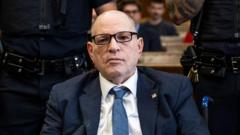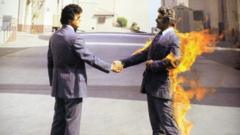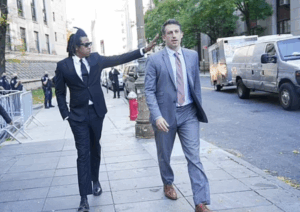The retrial of Harvey Weinstein, who faces renewed accusations of sexual abuse from three women, reveals the ongoing impact of the #MeToo movement and scrutiny around the systemic power imbalance in Hollywood. Attorneys present contrasting narratives as this case unfolds in New York.
Harvey Weinstein Retrial: Allegations of Abuse Highlight Hollywood's Dark Legacy

Harvey Weinstein Retrial: Allegations of Abuse Highlight Hollywood's Dark Legacy
In a retrial that has reignited discussions on power dynamics in Hollywood, Harvey Weinstein faces serious allegations of sexual misconduct from multiple women, as prosecutors argue that he exploited his influence in the industry.
In courtrooms across New York, Harvey Weinstein, the once-dominant film producer, finds himself embroiled in a retrial that could redefine his legacy. Prosecutors opened the case by emphasizing how Weinstein allegedly wielded his significant power in Hollywood to prey on vulnerable women, revealing the accounts of three individuals who claim they suffered at his hands. Assistant District Attorney Shannon Lucey made a compelling case, asserting that "The defendant wanted their bodies," and suggesting that the more the women resisted, the more aggressive he became.
This marks Weinstein's third trial in the past five years. In this retrial, he faces allegations from a former television production assistant, an aspiring actress, and a Polish model who claims she was assaulted at the tender age of 16. His legal team has responded by challenging the credibility of the accusers, with attorney Arthur Aidala insisting that the prosecution's claims will ultimately fail to convince jurors.
The distinctions between the current retrial and Weinstein's previous conviction are significant. Last April, the New York Court of Appeals overturned his prior conviction, primarily due to the controversial inclusion of testimonies from women whose allegations were not part of the specific charges against him. Meanwhile, the retrial’s jury, comprising seven women and five men, will be tasked with examining the alleged incidents of sexual assault, which often saw Weinstein luring women under the pretense of business meetings, only to force his advances.
As Lucey described the trauma experienced by the victims, recalling how they kept their shame concealed due to Weinstein's influential position, the gravity of the proceedings became apparent. In contrast, Aidala adopted a confrontational stance, accusing the women of engaging in "mutually beneficial" relationships driven by desires for fame and monetary gain. He particularly called attention to the subsequent cordial communications that these women maintained with Weinstein post-encounters, framing them as undermining their claims.
Weinstein, who is 73 years old, has recently faced health challenges including cancer, diabetes, and heart surgery. He was temporarily moved to the Bellevue hospital, having previously suffered from inadequate care at Rikers Island, a facility marked by controversy over its conditions. As he navigates the implications of this retrial, Weinstein faces a backdrop of over 100 allegations of sexual misconduct from women across the industry.
This retrial not only serves as a significant chapter in Weinstein's narrative but also continues the conversation sparked by the #MeToo movement, which has empowered many individuals to confront their abusers. As this case unfolds, it further exposes the entrenched power dynamics and systemic issues within the entertainment industry, inviting a deeper examination of the behaviors that have long been tolerated in Hollywood. Ultimately, how the jury interprets the evidence and narratives presented will have lasting implications beyond this case, influencing societal attitudes towards sexual misconduct and accountability in powerful circles.
This marks Weinstein's third trial in the past five years. In this retrial, he faces allegations from a former television production assistant, an aspiring actress, and a Polish model who claims she was assaulted at the tender age of 16. His legal team has responded by challenging the credibility of the accusers, with attorney Arthur Aidala insisting that the prosecution's claims will ultimately fail to convince jurors.
The distinctions between the current retrial and Weinstein's previous conviction are significant. Last April, the New York Court of Appeals overturned his prior conviction, primarily due to the controversial inclusion of testimonies from women whose allegations were not part of the specific charges against him. Meanwhile, the retrial’s jury, comprising seven women and five men, will be tasked with examining the alleged incidents of sexual assault, which often saw Weinstein luring women under the pretense of business meetings, only to force his advances.
As Lucey described the trauma experienced by the victims, recalling how they kept their shame concealed due to Weinstein's influential position, the gravity of the proceedings became apparent. In contrast, Aidala adopted a confrontational stance, accusing the women of engaging in "mutually beneficial" relationships driven by desires for fame and monetary gain. He particularly called attention to the subsequent cordial communications that these women maintained with Weinstein post-encounters, framing them as undermining their claims.
Weinstein, who is 73 years old, has recently faced health challenges including cancer, diabetes, and heart surgery. He was temporarily moved to the Bellevue hospital, having previously suffered from inadequate care at Rikers Island, a facility marked by controversy over its conditions. As he navigates the implications of this retrial, Weinstein faces a backdrop of over 100 allegations of sexual misconduct from women across the industry.
This retrial not only serves as a significant chapter in Weinstein's narrative but also continues the conversation sparked by the #MeToo movement, which has empowered many individuals to confront their abusers. As this case unfolds, it further exposes the entrenched power dynamics and systemic issues within the entertainment industry, inviting a deeper examination of the behaviors that have long been tolerated in Hollywood. Ultimately, how the jury interprets the evidence and narratives presented will have lasting implications beyond this case, influencing societal attitudes towards sexual misconduct and accountability in powerful circles.




















